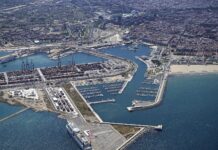
Industrial action at the Port of Montreal is already hitting regional industries hard and will have a devastating effect on employment in the Greater Montreal area, according to the Quebec Council of Employers (Conseil du patronat du Québec or CPQ).
Karl Blackburn CEO at the CPQ, which is also a member of the Chamber of Commerce of Metropolitan Montreal (CCMM) which called for government intervention in the strike on 10 August told Container News, that some factories have already had to stop manufacturing as they are unable to ship their products.
“Paper and wood producers cannot send products from the Nova Scotia Port of Halifax and they won’t be able to increase their inventory,” explained Blackburn. He went on to say that some mills will shut down and that will lead to employers laying off employees, he warned.
According to the CPQ another sector that is in a critical position is the food and agriculture industry which is already running short of certain products, “Bread requires margarine and sugar and many other products and they are running low,” said Blackburn, who also said that other “safety critical equipment” such as masks have been blocked at the port.
In an effort to move the dispute along the CPQ believes that a further 45 days of negotiations over the major issues that have prevented an agreement over the last two years should be agreed. After the 45-day deadline expires solutions for any outstanding issues should be imposed by government.
Blackburn said that 19,000 jobs depend either directly or indirectly on the port, government must push the MEA and unions to find a solution.

“If the strike carries on for much longer it will be devastating for the region, there have already been job losses, and already mills have shut down,” added the CEO, “But if everyone works in good faith we can resolve the strike.”
After failed talks on a new collective bargaining agreement in the autumn of 2018, the Maritime Employers Association, which represents terminal operators in Montreal Port resorted to the courts in an effort to prevent the dockers from striking. In June this year the court ruled in favour of the unions and a series of limited strikes began.
However, the employers then cut dockers pay by cutting the premium pay they received for working unsocial hours. The effective pay cut precipitated the indefinite strike that began on 10 August.
Nick Savvides
Managing Editor








